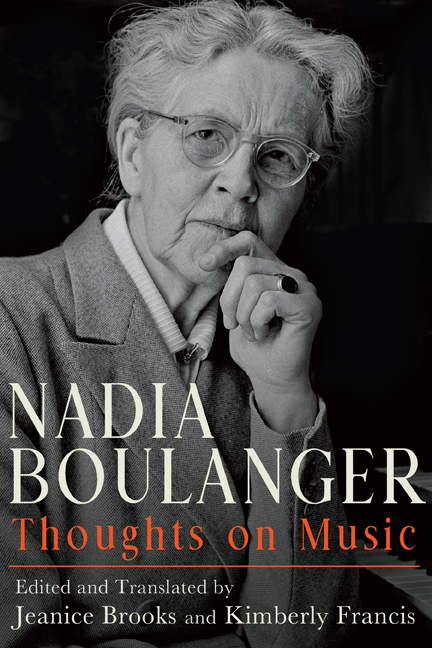Book contents
- Frontmatter
- Contents
- List of Illustrations
- Acknowledgments
- Editorial Apparatus and Critical Notes
- Note on Translations
- List of Abbreviations
- Timeline of Nadia Boulanger’s Life
- Introduction
- Part One Journalism, Criticism, Tributes
- Part Two Lectures, Classes, Broadcasts
- Bibliography of Nadia Boulanger’s Published Writing
- General Bibliography
- Index
“Les Concerts Symphoniques” Spectateur 3, no. 97 (April 8, 1947): 6 (complete text)
Published online by Cambridge University Press: 15 October 2020
- Frontmatter
- Contents
- List of Illustrations
- Acknowledgments
- Editorial Apparatus and Critical Notes
- Note on Translations
- List of Abbreviations
- Timeline of Nadia Boulanger’s Life
- Introduction
- Part One Journalism, Criticism, Tributes
- Part Two Lectures, Classes, Broadcasts
- Bibliography of Nadia Boulanger’s Published Writing
- General Bibliography
- Index
Summary
Concerts Reviewed
March 13, 1947 (Théâtre des Champs-Elysées,
Orchestre national)
L’Apocalypse selon St-Jean, Jean Françaix
Variations, Marcel Mihalovici
March 23, 1947 (Radio Broadcast, Orchestre national)
Overture, Georges Auric
Symphony no. 6 in B minor (“Pathétique”), op. 74, Pytor Il’yich Tchaikovsky
Le Baiser de la fée, Igor Stravinsky
Les Vêpres siciliennes (extracts), Giuseppe Verdi
It is an evening in autumn 1939. Jean Françaix is at the piano, at Mr. and Madame John Loudon’s, in this diplomatic residence of the Dutch Legation, where music holds such an important place. His wife, Blanche, standing next to the piano, sings. As soon as we hear the first notes, we look at each other, captivated! What is this work in which Jean Françaix, in each note, can be met and discovered! What tenderness, what solemnity, what serenity, what power! After such peace, what suddenly slips open into such chasms? What sobriety limits its expressivity? What mastery organizes the whole of it?
What calm dominates it? Jean Françaix just played for us, for the first time, L’Apocalypse, a work completed on September 12, 1939. He would finish the orchestration on December 31. And while Manuel Rosenthal, taken by this work in his own turn, was rehearsing it the other day, I saw again that night long ago, when Jean Françaix played it for us. He was here, so peaceful and sure, profound and reflective: nothing seemed capable of disrupting the internal happiness that inhabits his music. He broached an immense subject while reining it in to its essential proportions. He could be reproached, just as Fauré's Requiem could be reproached, for not being more dramatic, or as Bach's Cantata 54 could be for expressing a terrible threat with such gentleness, or as the latest works of Stravinsky could be for their order and their moderation. But it is of little importance. Those disconcerted by this are those who do not know who they are or where they are going. Jean Françaix follows a path from which nothing can turn him. It is likely that once performers and listeners familiarize themselves with L’Apocalypse, the work will appear in all its variety and its grandeur.
- Type
- Chapter
- Information
- Nadia BoulangerThoughts on Music, pp. 274 - 276Publisher: Boydell & BrewerPrint publication year: 2020

